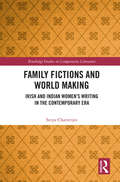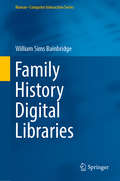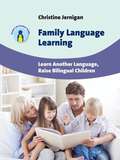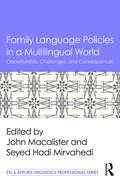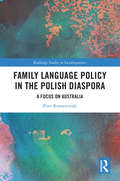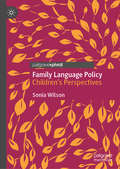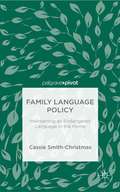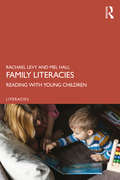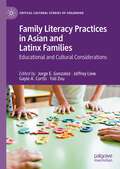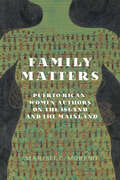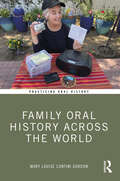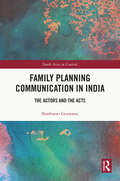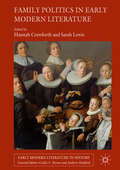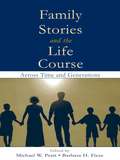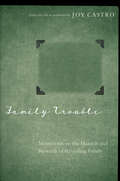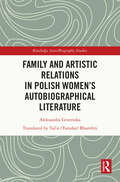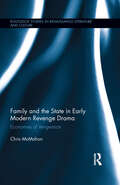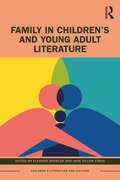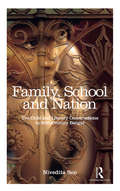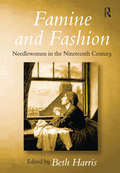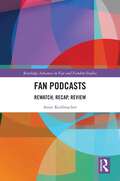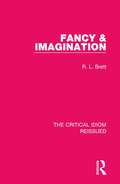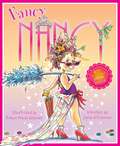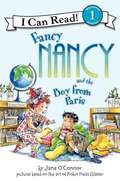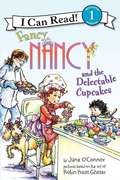- Table View
- List View
Family Fictions and World Making: Irish and Indian Women’s Writing in the Contemporary Era (Routledge Studies in Comparative Literature)
by Sreya ChatterjeeFamily Fictions and World Making: Irish and Indian Women’s Writing in the Contemporary Era is the first book-length comparative study of family novels from Ireland and India. On the one hand, despite an early as well as late colonial experience, Ireland is often viewed exclusively within a metropolitan British and Europe-centered frame. India, on the other hand, once seen as a model of decolonization for the non-Western world, has witnessed a crisis of democracy in recent years. This book charts the idea of "world making" through the fraught itineraries of the Irish and the Indian family novel. The novels discussed in the book foreground kinship based on ideological rather than biological ties and recast the family as a nucleus of interests across national borders. The book considers the work of critically acclaimed women authors Anne Enright, Elizabeth Bowen, Mahasweta Devi, Jennifer Johnston, Kiran Desai and Molly Keane. These writers are explored as representative voices for the interwar years, the late-modern period, and the globalization era. They not only push back against the male nationalist idiom of the family but also successfully interrogate family fiction as a supposedly private genre. The broad timeframe of Family Fictions and World Making from the interwar period to the globalization era initiates a dialogue between the early and the current debates around core and periphery in postcolonial literature.
Family History Digital Libraries
by William Sims BainbridgeIn the modern era, every family and local community can cultivate its own history, endowing living people with meanings inherited from the people of the past, by means of today’s computer-based information and communication technologies. A new profession is emerging, family historians, serving the wider public by assisting in collection and analysis of fascinating data, by teaching talented amateur historians, and by producing complete narratives. Essential are the skills and technologies required to preserve and connect photos, movies, videos, diaries, memoirs, correspondence, artefacts and even architecture such as homes. Online genealogical services are well established sources of official government records, but usually not for recent decades, and not covering the valuable records of legal, medical, and religious organizations. Information can be shared and interpreted by family members through oral history interviews, social media, and online private archives such as wikis and shared file depositories. This book explores a wide variety of online information sources and achieves coherence by documenting and interpreting the history of a particular extended American family on the basis of 9 decades of movies and videos, 17 decades of photographs, and centuries of documents. Starting now, any family may begin to preserve their current experiences for the historians of the future, but this will require social as well as technical innovations. This book is the essential resource, providing the fundamental principles, effective methods, and fascinating questions required to make our past live again.
Family Language Learning
by Christine JerniganFamily Language Learning is a practical guide designed to support, advise and encourage any parents who are hoping to raise their children bilingually. It is unique in that it focuses on parents who are not native speakers of a foreign language. It gives parents the tools they need to cultivate and nurture their own language skills while giving their children an opportunity to learn another language. The book combines cutting-edge research on language exposure with honest and often humorous stories from personal interviews with families speaking a foreign language at home. By dispelling long-held myths about how language is learned, it provides hope to parents who want to give their children bilingual childhoods, but feel they don't know where to start with learning foreign languages.
Family Language Policies in a Multilingual World: Opportunities, Challenges, and Consequences (ESL & Applied Linguistics Professional Series)
by John Macalister Seyed Hadi MirvahediThrough case studies from around the world, this book illustrates the opportunities and challenges facing families negotiating the issues of language maintenance and language learning in the home. Every family living in a bi/multilingual environment faces the question of what language(s) to speak with their children and must make a decision, consciously or otherwise, about these issues. Exploring links between language policy in the home and wider society in a range of diverse settings, the contributors utilize various research tools, including interviews, questionnaires, observations, and archival document analysis, to explore linguistic ideologies and practices of family members in the home, illuminating how these are shaped by macro-level societal processes.
Family Language Policy in the Polish Diaspora: A Focus on Australia (Routledge Studies in Sociolinguistics)
by Piotr RomanowskiThis book explores language practices, beliefs and management across a group of Polish immigrant families in Australia, drawing on these case studies as a lens through which to unpack dynamics of Family Language Policy (FLP) and their implications for future research on FLP. The volume begins by outlining the historical context of Polish immigration in Australia, charting two key waves of Polish migration in the 20th century and the subsequent unfolding of issues around language and culture maintenance in these families. This discussion paves the way for exploring key themes of language socialization, language ideologies and heritage language maintenance and the affordances of FLP research in elucidating these dynamics at work in the lived experiences of a group of Polish immigrant families in Melbourne. The book highlights the importance of a triangulated approach, integrating qualitative and quantitative methods, in offering nuanced insights into parental approaches and children’s experiences of a bilingual upbringing and the wider impact of FLP on transnational families. Opening up avenues for future research on Family Language Policy and a better understanding of the language practices of specific communities in a globalised world, this book will be of interest to scholars in multilingualism, sociolinguistics and applied linguistics.
Family Language Policy: Children’s Perspectives
by Sonia WilsonThis book explores the question of family language policy in multilingual households. Presenting six case studies which focus on the experiences of parents and children in French-English bilingual contexts, the author draws conclusions about the impact of parental language management on the family as a whole which can be applied to transnational families from other linguistic backgrounds. While many parental guides on bilingual childrearing have been published in recent years, little attention has been paid to the possible impact of such language strategies on the experiences and interrelationships of bilingual family members. This book is unique in focusing in depth on the psychology and experiences of the child, and it will be of interest to readers in fields as diverse as sociolinguistics, language policy and planning, sociology of youth and family, and child psychology.
Family Literacies: Reading with Young Children (Literacies)
by Rachael Levy Mel HallFamily Literacies demonstrates, through reference to empirical research, how shared reading practices operate in a wide range of families, with a view to supporting families in reading with their pre-school children. At the heart of this book, written by two highly experienced experts in the field, is a fascinating project that captured diverse voices, and experiences by parents, children and other family members. Rachael Levy and Mel Hall deploy a rich and distinctive theoretical framework, drawing on insights from literacy studies, education and sociology. Family Literacies presents an account of shared reading practices in homes, focusing attention on what motivates parents to read with their children as well as revealing what parents may need if they are to begin and sustain shared reading activity. The authors show the many ways in which reading is centrally embedded in many aspects of family life, arguing that this has particular implications for children as they start school. Situated within a socio-cultural discourse, this book explains why it is important to understand how and why shared reading takes place in homes so that all families can be supported in reading with their children. Family Literacies is essential reading for all those who are studying and researching literacy practices, especially those involving young children. The book will also be of value to students, practitioners and researchers in education and applied linguistics who are working with families and have an interest in the study of family practices. The authors’ findings have major implications for how parents can be encouraged to develop positive reading relationships with their children.
Family Literacy Practices in Asian and Latinx Families: Educational and Cultural Considerations (Critical Cultural Studies of Childhood)
by Jeffrey Liew Gayle A. Curtis Yali Zou Jorge E. GonzalezThis book focuses on the literacy beliefs and practices of parents and children from Asian and Latinx heritage backgrounds. In the US, children from Asian and Latinx immigrant backgrounds represent the largest population of dual language learners in schools. While existing research has paid significant attention to the roles of parenting and the home literacy environment on children's literacy development, relatively little attention has been allocated to immigrant families. Chapters aim to meet the need in the field to understand the roles of culture and immigrant experiences on children's literacy learning and development, including immigrant families' home environments and parents' involvement in literacy-related activities in both English and the parents' native language. As Hispanic/Latinx and Asian American populations grow in the US, this book answers an urgent call for school systems and child and family professionals to be aware of issues in this area and how to address them in culturally responsive ways.
Family Matters: Puerto Rican Women Authors on the Island and the Mainland (New World Studies)
by Marisel C. MorenoAdopting a comparative and multidisciplinary approach to Puerto Rican literature, Marisel Moreno juxtaposes narratives by insular and U.S. Puerto Rican women authors in order to examine their convergences and divergences. By showing how these writers use the trope of family to question the tenets of racial and social harmony, an idealized past, and patriarchal authority that sustain the foundational myth of la gran familia, she argues that this metaphor constitutes an overlooked literary contact zone between narratives from both sides. Moreno proposes the recognition of a "transinsular" corpus to reflect the increasingly transnational character of the Puerto Rican population and addresses the need to broaden the literary canon in order to include the diaspora. Drawing on the fields of historiography, cultural studies, and gender studies, the author defies the tendency to examine these literary bodies independently of one another and therefore aims to present a more nuanced and holistic vision of this literature.
Family Oral History Across the World (Practicing Oral History)
by Mary Louise Contini GordonFamily Oral History Across the World presents a process for memorializing family histories, bringing together established oral history standards, exploratory research, and narrative data analysis. Based on and using a prequestionnaire and over 40 recorded interviews with people from across six continents, the analysis system used in the book presents material from these interviews that brings alive the experience of the family history journey. One of the guiding principles is to encourage readers to interview family members, but also others outside the family unit, and to produce a family history in whatever format works. The book illustrates this through the inclusion of many unusual formats and stories uncovered. The book is divided into a number of themes that emerged through the analysis of numerical questionnaire and narrative interview data. Parts I, II, and III cover changing family demography, case studies, and factors such as memory, emotion, and ethics. Part IV offers a pliable process and practice guide with input and examples from interviews. It also discusses developing approaches to presenting oral histories from both oral historians and other interviewers and writers, such as journalists. With case studies as well as example guidelines and templates, this volume is ideal both for academics interested in family history as well as professional genealogists and families themselves.
Family Planning Communication in India: The Actors and the Acts (South Asia in Context)
by Shashwati GoswamiThis book is the first systematic study on the historiography of the family planning communication process in India. It traces the history of the development of a highly technical health communication process. It discusses how the discourse on India’s population problem was at the heart of the development dialogue which was being promoted by the British colonial administration. The book examines the role of the censuses and the Five-Year plans in the development of the discussion on the population ‘explosion’ in India. Also, it critically discusses the role of the Ford Foundation’s leadership in institutionalising the communication process in India. The book essentially argues that population control communication enabled the ideas of a homogenised nation, an 'ideal' Indian woman and an ‘ideal’ Indian family. This, in turn, led to the obliteration of cultural, ethnic, geographical and economic specificities of India as a country. The volume will be of great interest to scholars and researchers of public policy, media and communication studies, Indian politics, modern Indian history and South Asian Studies.
Family Politics in Early Modern Literature
by Hannah Crawforth Sarah LewisThis book considers the ways that family relationships (parental, marital, sibling or other) mimic, and stand in for, political ones in the Early Modern period, and vice versa. Bringing together leading international scholars in literary-historical fields to produce scholarship informed by the perspective of contemporary politics, the volume examines the ways in which the family defines itself in transformative moments of potential crisis - birth and death, maturation, marriage - moments when the family is negotiating its position within and through broader cultural frameworks, and when, as a result, family 'politics' become most apparent.
Family Stories and the Life Course: Across Time and Generations
by Michael W. Pratt Barbara H. FieseThis edited book draws from work that focuses on the act of telling family stories, as well as their content and structure. The process of telling family stories is linked to central aspects of development, including language acquisition, affect regulation, and family interaction patterns. This book extends across traditional developmental psychology, personality theory, and family studies. Drawing broadly on the epigenetic framework for individual development articulated by Erik Erikson, as well as on conceptions of the family life cycle, the editors bring together contemporary examples of psychological research on family stories and their implications for development and change at different points in the life course. The book is divided into sections that focus on family stories at different points in the life cycle, from early childhood and the beginnings of narrative skill, through adolescence, young adulthood, midlife, and then mature adulthood and its intergenerational meaning. During each of these periods of the life cycle, research focusing on individual development within an Eriksonian framework of ego strengths and virtues is highlighted. The dynamic role of family stories is also featured here, with work exploring the links between family process, intergenerational attachment, and storytelling. Sociocultural theories that emphasize how such development is situated in the wider cultural context are also featured in several chapters. This broad lifespan developmental focus serves to integrate the exciting diversity of this work and foster further questions and research in the emerging field of family narrative. The book is intended primarily for researchers and advanced-level students in the fields of developmental and personality psychology, as well as those in family studies and in gerontology. It may also be of interest to those in the helping professions who are concerned with family therapy and family issues, and may--due to its content and illustrative material--have appeal to a wider market of the lay public. The chapters are written in a readily accessible style and the analyses are presented in a fairly non-technical way. Because family stories are charted across the lifespan, it would be a suitable companion book to a more traditional lifespan textbook in certain courses.
Family Trouble: Memoirists on the Hazards and Rewards of Revealing Family
by Joy CastroWhenever a memoirist gives a reading, someone in the audience is sure to ask: How did your family react? Revisiting our pasts and exploring our experiences, we often reveal more of our nearest and dearest than they might prefer. This volume navigates the emotional and literary minefields that any writer of family stories or secrets must travel when depicting private lives for public consumption.Essays by twenty-five memoirists, including Faith Adiele, Alison Bechdel, Jill Christman, Judith Ortiz Cofer, Rigoberto González, Robin Hemley, Dinty W. Moore, Bich Minh Nguyen, and Mimi Schwartz, explore the fraught territory of family history told from one perspective, which, from another angle in the family drama, might appear quite different indeed. In her introduction to this book, Joy Castro, herself a memoirist, explores the ethical dilemmas of writing about family and offers practical strategies for this tricky but necessary subject.A sustained and eminently readable lesson in the craft of memoir, Family Trouble serves as a practical guide for writers to find their own version of the truth while still respecting family boundaries.
Family and Artistic Relations in Polish Women’s Autobiographical Literature (ISSN)
by Aleksandra GrzemskaFamily and Artistic Relations in Polish Women’s Autobiographical Literature examines women’s autobiographical works published in Poland after the year 2000 in a broader cultural context. This volume focuses on the writers’ representation of their relationships with their mothers – many of them traumatized survivors of historical cataclysms, many of them professional artists, many of them struggling to reconcile their creative work with their role as wife and mother. Grzemska sheds light not only on the literary strategies used by the memoirists, but she also helps us understand women’s struggles for an independent voice, for new models of commemoration, for healing. This book will interest readers in literary and cultural studies, as well as anyone who wishes to better understand Poland’s cultural transformations in the post-Communist era.
Family and the State in Early Modern Revenge Drama: Economies of Vengeance (Routledge Studies in Renaissance Literature and Culture)
by Chris McMahonIn this book, McMahon considers Early Modern revenge plays from a political science perspective, paying particular attention to the construction of family and state institutions. Plays set for close study are The Spanish Tragedy, Hamlet, The Revenger’s Tragedy, The Malcontent and The Duchess of Malfi. The plays are read as unique events occupying positions in historical process concerning the privatisation of the family (by means of symbolism and concrete household strategies such as budgeting and surveillance) and the subsequent appropriation of the family and its methods by the state. The effect is that family becomes an unofficial organ of the state. This process, however, also involves the reform of the state along lines demanded by the private family. McMahon’s critical method, derived from the theory of Bourdieu, Bataille, and Girard, maps capital transactions to reveal emotionally charged, often idiosyncratic responses to issues of shared concern. Such issues include state corruption, the management of women, the performance of roles according to gender, the uses of surveillance, and the ethics of sacrifice.
Family in Children’s and Young Adult Literature (Children's Literature and Culture)
by Eleanor Spencer and Jade Dillon CraigFamily in Children's and Young Adult Literature is a comprehensive study of the family in Anglophone children’s and Young Adult literature from the early nineteenth century to the present day. Written by intellectual leaders in the field from the UK, the Americas, Europe, and Australia, this collection of essays explores the significance of the family and of familial and quasi-familial relationships in texts by a wide range of authors, including the Grimms, Frances Hodgson Burnett, Rudyard Kipling, Enid Blyton, Judy Blume, Jaqueline Wilson, Malorie Blackman, Melvin Burgess, J.K. Rowling, Neil Gaiman, and others. Author-based and critical survey essays explore evolving depictions of LGBTQIA+ and BAME families; migrant and refugee narratives; the popular tropes of the orphan protagonist and the wicked stepmother; sibling and intergenerational familial relationships; fathers and fatherhood; the anthropomorphic animal and surrogate family; and the fractured family in paranormal and dystopian YA literature. The breadth of essays in Family in Children's and Young Adult Literature encourages readers to think beyond the outdated but culturally privileged ‘nuclear family’ and is a vital resource for students, academics, educators, and practitioners.
Family, School and Nation: The Child and Literary Constructions in 20th-Century Bengal
by Nivedita SenThis seminal work examines the concurrence of childhood rebellion and conformity in Bengali literary texts (including adult texts), a pertinent yet unexplored area, making it a first of its kind. It is a study of the voice of child protagonists across children’s and adult literature in Bengali vis-à-vis the institutions of family, the education system, and the nationalist movement in the ninenteenth and twentieth centuries.
Famine and Fashion: Needlewomen in the Nineteenth Century
by Beth HarrisLike the figure of the governess, the seamstress occupied a unique place in the history of the nineteenth century, appearing frequently in debates about women's work and education, and the condition of the working classes generally in the rapidly changing capitalist marketplace. Like the governess, the figure of the needlewoman is ubiquitous in art, fiction and journalism in the nineteenth century. The fifteen articles in this book address the seamstress's appearance as a 'real' figure in the changing economies of nineteenth-century Britain, America, and France, and as an important cultural icon in the art and literature of the period. They treat the many different types of needlewomen in the nineteenth century-from skilled milliners and dressmakers, some of whom owned their own businesses selling merchandise to other women (forming a unique 'female economy') to women who, through reduced circumstances, were forced into the lowest end of paid needlework, sewing clothing at home for starvation wages-like the impoverished shirt-maker in the famous Victorian poem by Thomas Hood, 'The Song of the Shirt.' This volume assembles the work of leading American, British and Canadian scholars from many different fields, including art history, literary criticism, gender studies, labor history, business history, and economic history to draw together recent scholarship on needlewomen from a variety of different disciplines and methodologies. Famine and Fashion will therefore appeal to anyone studying images of work in the nineteenth century, popular and canonical nineteenth-century literature, the history of women's work, the history of sweated labor, the origins of the ready-made clothing industry and early feminism.
Fan Podcasts: Rewatch, Recap, Review (Routledge Advances in Fan and Fandom Studies)
by Anne KorfmacherStarting from the observation of the ubiquity of fan podcasts engaging in media commentary, this book explores three fan podcast genres in which commentary manifests as a structuring form: rewatch and reread podcasts, recap podcasts, and review podcasts.The author conducts a formalist genre analysis of these podcasts, close reading nine case studies to describe how the three genres function and how different fan labour manifests in podcasting. Each case study teases out the themes, style, and formal constellations of the three podcast genres, shows how different fans activate the affordances of podcasting and commentary, and reveals the distinct generic functions of the three podcast genres.This book will be of significant interest to scholars and students in podcast studies, fan studies, cultural studies and literary studies who are interested in fan podcasts, podcast genre analysis, and ways of close reading podcasts as texts.
Fancy & Imagination (The Critical Idiom Reissued #5)
by R. L. BrettFirst published in 1969, this book provides a concise and helpful introduction to the terms ‘fancy’ and ‘imagination’. Although they are generally associated with Samuel Taylor Coleridge, the work begins with a discussion the history of these concepts which were also known to Aristotle, the Elizabethans, Hobbes, Locke and Blake. It then goes on to examine Coleridge’s theory of imagination and the distinction he drew between fancy and imagination. This work will be of particular interest to those studying Coleridge and the Romantic Movement.
Fancy Nancy 10th Anniversary Edition (Fancy Nancy)
by Jane O'Connor*NOW A HIT TV SERIES ON DISNEY JUNIOR*Fancy Nancy celebrates a decade (that’s a fancy word for TEN years)!This book introduces Nancy, who believes that more is ALWAYS better when it comes to being fancy. From the top of her tiara down to her sparkly studded shoes, Nancy is determined to teach her family a thing or two about being fancy and using fancy words. Fancy Nancy fans and little girls alike are sure to delight in this special edition of a household favorite.Brought to you by the dazzling New York Times bestselling duo Jane O’Connor and Robin Preiss Glasser, this extra-fancy edition features a link to a free downloadable song from Fancy Nancy the Musical as well as a sheet of lyrics to the song in the back of the book.Perfect for fans of the Eloise and Olivia books.Ooh la la! Fancy Nancy is starring in her own fabulous TV show on Disney Junior. READ THE BOOKS THAT STARTED IT ALL!Fancy NancyFancy Nancy and the Posh PuppyFancy Nancy: Bonjour, ButterflyFancy Nancy: Splendiferous ChristmasFancy Nancy and the Fabulous Fashion BoutiqueFancy Nancy and the Mermaid BalletFancy Nancy: Fanciest Doll in the UniverseFancy Nancy and the Wedding of the CenturyFancy Nancy 10th Anniversary EditionFancy Nancy: Saturday Night SleepoverFancy Nancy: Oodles of Kittens
Fancy Nancy and the Boy from Paris (I Can Read! #Level 1)
by Jane O'Connor<P>There's a new boy in school, and he's from Paris. <P>Nancy cannot believe her luck. But this Parisian may not be as fancy as Nancy expects!
Fancy Nancy and the Delectable Cupcakes (I Can Read! #Level 1)
by Jane O'Connor<P>Nancy has been having a little trouble paying attention in class--but when it's time to get ready for the school bake sale, she is all ears. With Mom's help, Nancy remembers to follow all of the directions for a delectable batch of cupcakes . . . except for one very important detail! <P>Young readers will laugh out loud at Nancy's cupcake calamity in this funny I Can Read story!
